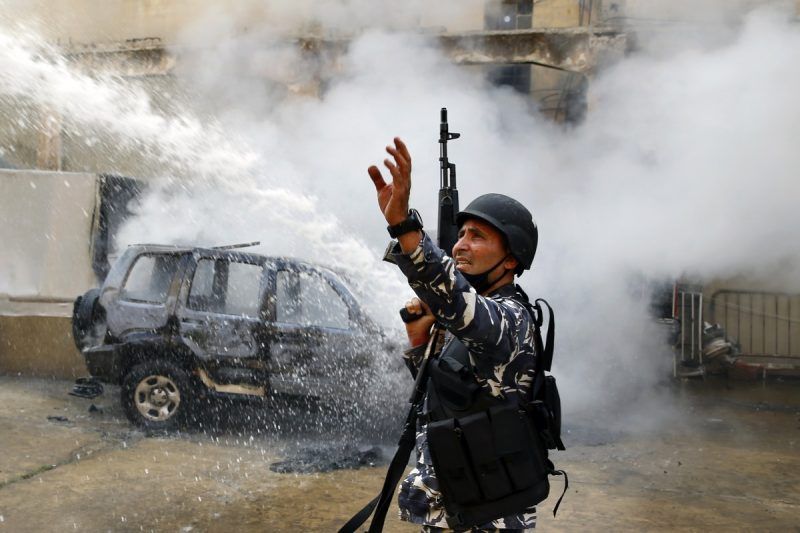
Covid-19 hasn’t unleashed its full force on the Middle East — yet. If or when it does, it is expected to overwhelm the region’s fragile health services and leave behind a trail of pain and destruction.
Common sense suggests that such a crisis should rearrange priorities in the Middle East. It should help rulers and opposition groups understand that good governance, not identity feuds, is their main challenge, and that improving health services, expanding access to clean water and ensuring safe housing cannot be achieved by repression or Islamization.
The covid-19 crisis should also remind Middle Eastern states that protecting national security requires regional integration, not rivalry with neighbors. This is an opportunity for these states to overcome their historic resentment and become an integral part of the global order.
Finally, the crisis should remind Middle Eastern leaders of the urgent need to restructure their states’ archaic regulatory institutions and prepare their economies for post-coronavirus realities.
Unfortunately, there is no sign of any of the above happening. If anything, Middle Eastern states seem to be digging their heels deeper.
The crisis seems to offer Middle Eastern rulers more reasons for repression, from extending emergency law and expanding executive powers in Egypt to further muzzling freedom of speech in Persian Gulf states, Morocco and Algeria by criminalizing “spreading rumors” about the crisis and the ways in which governments have handled it. Instead of building a coalition to reform their flailing health sectors, Middle Eastern rulers are using their control over the media to convince their populations that everything is fine and blame shortcomings on imaginary enemies. Egypt is a good example: It is rife with claims that its ministry of health has a tight grip on the pandemic and had developed a cure for covid-19 that it shared with China and then Italy, enabling both countries to curb the spread of the virus.
On the other hand, opposition groups have yet to show a sign of readiness to face the real challenge of governance in their failing states. So far, their strategies remain focused on contesting power, whether by peaceful protests or by violence. In the middle of the crisis, frustrated Lebanese protesters started setting their failed banks on fire, while Egyptians marched against covid-19 in Alexandria. As for radical Islamists, they continue their anachronistic fight undisturbed, with their Sinai attack last week killing or injuring 10 military personnel, according to the Egyptian army.
Nor has the crisis affected how Middle Eastern states view each other either. The two countries with the highest number of covid-19 cases in the Middle East, Turkey and Iran, carry on, with Qatar, their rivalry against Saudi Arabia and United Arab Emirates. Their confrontations in Libya, Yemen and Syria continue to shape the civil wars there. This rivalry also continues to plague political processes in Iraq and Lebanon, with devastating consequences for local populations.
As for moving beyond historical resentment and fears, covid-19 seems to push Middle Eastern countries in the opposite direction. Instead of seeing the crisis as reason for renewed and better globalization, as Jordan’s King Abdullah II recently argued for in The Post, most of the region is drowning in conspiracy theories attributing the pandemic to an American plot. In March, Iran’s Supreme Leader Ayatollah Ali Khamenei echoed these theories, rejecting a U.S. offer to help Iran fight the virus on the grounds that maybe U.S. “medicine is a way to spread the virus more”.
And if anyone entertained hopes that the pandemic would prompt Middle Eastern states to prepare for post-coronavirus economic realities, their recent competition to ravage the oil market, depleting their own revenue in the process, should put these hopes to rest.
Israel, as usual, stands out as a category in its own right. Its spectacularly dysfunctional political regime used the covid-19 crisis to extend its life while it prioritized repression of the Palestinian segment of its inhabitants over combating the virus, expanded its already vast network of surveillance and engaged in a process to annex parts of the West Bank that will pit the country further against the region and beyond.
Those who pin their hopes for a better Middle East on shocks that compel its leaders to reconsider their strategies stand to be disappointed. In the Middle East, as in the rest of the world, perceptions are more powerful than reality. Even a global pandemic cannot shatter the entrenched premises upon which Middle Eastern elites have constructed their worldviews.
History shows that previous failures — whether military defeats or economic, social and political collapse — had been absorbed and reinterpreted to reinforce these worldviews. Middle Eastern ruling elites have an extraordinary ability to stand tall over the ruins and redefine failure as success. Like earlier elites who ruled the Middle East until the 1950s, they seem determined to continue their march toward self-destruction undisturbed by the repeated signs and writings on the wall.
Ezzedine C. Fishere is The Post's second Jamal Khashoggi fellow. He is the author of “The Egyptian Assassin” and a senior lecturer at Dartmouth College.
